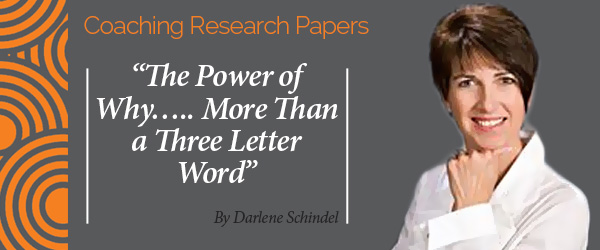
A Research Paper created by Darlene Schindel
(Health and Wellness Coach CANADA)
It’s everywhere, every day, everybody, every job – sadness, fatigue, burnout, frustration, anger, resentment, boredom, lack of engagement, blame, discontent, disappointment, lack of productivity. In general, as a society the problems and challenges we face both in our personal and professional work lives are keeping us from living the life we want, from being happy and feeling fulfilled and charged up about who we are and what we are doing. Some of us may be better off than others, yet in general, we truly are not living to our full potential, in ease, in happiness, joy and abundance. WHY is that? The key may be in that simple three letter word WHY. When you say it, your voice goes up and it becomes not a word but a question.
Connection between Why and Want
Do we even KNOW WHAT WE WANT? Sadly, millions of us spend more time choosing furniture, bed sheets, electronic toys and gadgets than we do figuring out what it is that we truly want, what it is we are good at, what our passions and skills are and how we want to use them. WHY is that?
I submit to you, it is because we do not know our own WHY.
In his book Man’s Search for Meaning Viktor Frankl, a renowned psychologist and Holocaust survivor wrote “Those who have a ‘why’ to live, can bear with almost any ‘how’.” I am not sharing something new and unique here. The power of ‘WHY’ has been written and talked about in the last decade by hundreds of thought leaders from people like Stephen Covey, Tony Robbins, Malcolm Gladwell, Simon Sinek, Brendon Burchard, Amanda Lang, and numerous others.
Here is the simple interpretation of the power of WHY: Most people will never get what they want in their lives because they do not know WHY they want it. David Chilton, author of The Wealthy Barber Returns succinctly stated that the power of why changes the way you think, and therein lies the secret of this tiny word – it is in the way we think.
Nowhere has this been more simply and eloquently described than by Simon Sinek in his 2009 TED Talk – How Great Leaders Inspire Action. He presents what he calls ‘the golden circle’. The circle consists of three circles, one inside the other. The centre is the circle of WHY surrounded by the circle of HOW and finally the circle of WHAT. Sinek explains that we all know what it is that we do. Some of us even know how we do this, and yet very few people can state WHY they do what they do. WHY is your cause, your purpose, your belief, the reason you get out of bed in the morning. According to Sinek most of us operate from the outside in, from the clearest to the fuzziest concept, and yet inspired thinkers and leaders think the exact opposite, from the inside out, from the WHY to the WHAT.
The reason thinking and living from your WHY is so powerful is that people don’t connect so much to what it is you do, they connect strongly to WHY you do what you do. They connect to your belief, your purpose. So if you don’t know why you do what you do, how will anyone ever relate to you in a real, purposeful, and meaningful way?
Sinek correlates the golden circle to our human biology in order for us to understand this even better. In the cross sectional anatomy of the brain, the outer part which is the neo- cortex aligns with the ‘what’ of the golden circle. This is the location of language and rational thought. The inner two circles, the ‘how and why’ aligns with the limbic brain. It is here that our human behaviour and feelings reside. This area has no capacity for language, yet it controls our behaviour. This is where our ‘gut decisions’ come from. You can probably easily recall an example when you were required to make a decision and although you had all the facts before you, something just didn’t feel right and you didn’t proceed. Sometimes we call this making a gut decision, or even feeling something in our soul.
By understanding that our perception leads to our thoughts, and that it is our thoughts and our thinking that is responsible for creating our reality, then it doesn’t take much to see the importance of changing our thinking in creating our reality. Just by changing the way you look at things, the things you look at change.
So you may be thinking, ‘I don’t want to be a great leader, I just want to be me. I’m not inspiring millions of people I just want to be happy’. Even more reason for you to know your WHY. Only you are responsible for your happiness and no one else. Think back to what we said earlier – most people will never get what they want because they don’t know WHY they want it.